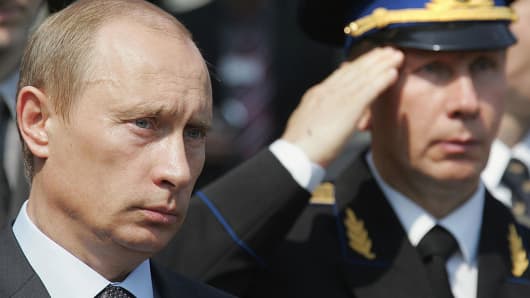Source: THE MOSCOW TIMES
Russian President Vladimir Putin could be forging a "personal" army to deal with rising domestic tensions, according to analysts who have been watching an overhaul of the country's security services.
Executive orders published by the Kremlin this month proposed the creation of a new National Guard, which will be led by Putin's former bodyguard, Viktor Zolotov, who would report directly to the president himself.
The guard will draw on internal troops from the country's interior ministry, and has been described by Russian media as a major reorganization of the country's security services.
Russian President Vladimir Putin could be forging a "personal" army to deal with rising domestic tensions, according to analysts who have been watching an overhaul of the country's security services.
Executive orders published by the Kremlin this month proposed the creation of a new National Guard, which will be led by Putin's former bodyguard, Viktor Zolotov, who would report directly to the president himself.
The guard will draw on internal troops from the country's interior ministry, and has been described by Russian media as a major reorganization of the country's security services.
Kremlin documents say the new body will serve in
part as a counter terrorism force and ensure national and public
security, as well as guard governmental facilities and protect state
borders. It is also expected to help enforce any state of emergency and
"carry out other relevant tasks."
While the creation of the National Guard has long been expected, some critics have suggested that the timing is particularly suspicious, given upcoming parliamentary elections this September and a presidential ballot slated for 2018.
Kremlin spokesperson Dmitry Peskov has said he couldn't explain the timing, but has rejected claims that it was linked to Duma elections or the mistrust of existing law enforcement, according to a BBC report. Peskov did not immediately respond to CNBC when contacted by email.
Still, New York University professor and Russia security expert Mark Galeotti suggested the new body could be used as a tool to control the Russian populace.
"This may not only be a force to keep the masses in check, but also the elite," Galeotti wrote in an April 5 blog post on his personal website.
While the creation of the National Guard has long been expected, some critics have suggested that the timing is particularly suspicious, given upcoming parliamentary elections this September and a presidential ballot slated for 2018.
Kremlin spokesperson Dmitry Peskov has said he couldn't explain the timing, but has rejected claims that it was linked to Duma elections or the mistrust of existing law enforcement, according to a BBC report. Peskov did not immediately respond to CNBC when contacted by email.
Still, New York University professor and Russia security expert Mark Galeotti suggested the new body could be used as a tool to control the Russian populace.
"This may not only be a force to keep the masses in check, but also the elite," Galeotti wrote in an April 5 blog post on his personal website.
The guard "will be directly subordinated to the
government, without a minister in the way. With Zolotov at its head,
then it is even more clearly a personal, presidential Praetorian force,
under a maximalist loyalist," he added, referring to the bodyguards used
by Roman emperors.
A statement obtained by Russian media last week showed that the State Duma Defense Committee is now not only recommending that the lower house approve the president's proposal for the creation of the National Guard, but is suggesting the force be given legal permissions to openly fire on crowds.
Otilia Dhand, a vice president at Teneo Intelligence, told CNBC that the reorganization "reflects the government's thinking on emerging security risks."
"It appears that the administration is creating a powerful deterrent against anticipated public unrest or, potentially, insurrection," she told CNBC by email.
"This is Putin concerned over internal security situation due to risk of widespread public demonstrations due to unpaid wages and rising prices, and the threat of terrorism in the Caucasus," she added.
A statement obtained by Russian media last week showed that the State Duma Defense Committee is now not only recommending that the lower house approve the president's proposal for the creation of the National Guard, but is suggesting the force be given legal permissions to openly fire on crowds.
Otilia Dhand, a vice president at Teneo Intelligence, told CNBC that the reorganization "reflects the government's thinking on emerging security risks."
"It appears that the administration is creating a powerful deterrent against anticipated public unrest or, potentially, insurrection," she told CNBC by email.
"This is Putin concerned over internal security situation due to risk of widespread public demonstrations due to unpaid wages and rising prices, and the threat of terrorism in the Caucasus," she added.
Economic sanctions linked to Russia's involvement
in Ukraine have compounded the pains of low crude oil prices, both of
which have put pressure on the ruble and sent inflation soaring, making
it harder for consumers who have faced rising food prices and squeezed
wages.
Suggestions that the National Guard is meant to clamp down on the political opposition is "missing the point," Dhand explained, adding the Kremlin has "other tools" to handle party leaders like Parnas Party head Mikhail Kasyanov and Progress Party head and activist Alexei Navalny.
"Opposition politicians with 2 to 3 percent public support are actually not the Kremlin's main headache," she said.
Suggestions that the National Guard is meant to clamp down on the political opposition is "missing the point," Dhand explained, adding the Kremlin has "other tools" to handle party leaders like Parnas Party head Mikhail Kasyanov and Progress Party head and activist Alexei Navalny.
"Opposition politicians with 2 to 3 percent public support are actually not the Kremlin's main headache," she said.


No comments:
Post a Comment